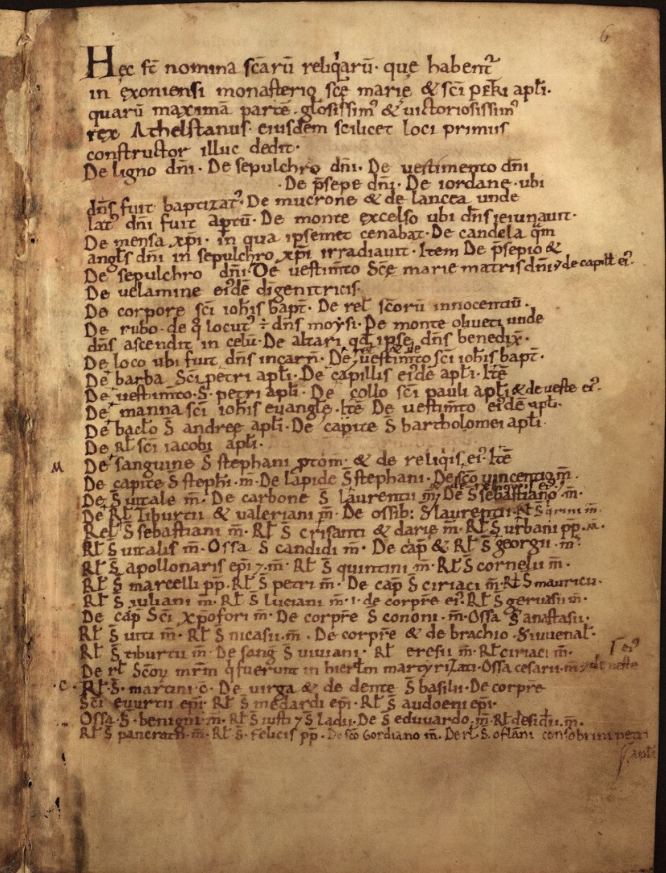
Ordering Knowledge in Tenth-Century England
Lists and their Manuscript Contexts
Supervisory team: Dr Robert Gallagher (Kent), Prof. Julia Crick (King’s)
Based at: Kent
KOM Theme: C – Systems of Knowledge
Historians and textual scholars are starting to turn their attention to mundane aspects of textual production. The list and the register are at last being recognized as more than means to an end, but as objects of study in their own right, from antiquity to the present day (Cole Young, 2017; DeVivo 2010; Bernheimer and Vollandt 2023). Ordering and retrieving information, in particular the imposition of order on a body of received material, are processes which constitute cultural work in their own right, and they leave important traces about the reception of knowledge. The contents of lists, their structures and their manuscript contexts can all be highly revealing: as ways of identifying new textual sources; as routes into understanding readership and the reception of textually transmitted knowledge; and as case studies for exploring the forms, functions and creation of the books in which they are preserved.
The focus of this project is on the multilingual world of England between the ninth and eleventh centuries. This was a period in which the intellectual trajectory of English history took decisive new directions. The vernacular matured as a language of scholarship and intellectual interchange; paradoxically, this happened just as the wash of relatively new Latin texts from continental Europe was at its most intense. Simultaneously, book culture in England changed decisively and permanently, and was clearly open to the influence of continental scholars and continental practices. Within this context, lists represent an exciting, relatively untapped corpus for opening up questions about the ordering of knowledge, and hence about how contemporaries negotiated the very different influences at work in the period. Building on several studies that have focused on specific manuscripts and genres of lists from tenth-century England, including work by Jacqueline Stodnick (2006), Birte Walbers (2012) and Kees Dekker (2019), we want the present project to extend our view of this phenomenon to include new case studies and new intellectual and historical frameworks, whether they be in regard to specific milieux, cultural practices or intellectual developments. For instance, how distinctive were the lists of particular communities, individuals or textual traditions? And what might they tell us about attitudes to, and uses of, the written word and books?
Applicants for this project are expected to have a working knowledge of Latin and codicology, as well as a strong understanding of relevant historical contexts. Prior knowledge of Old English is also desirable.
Bibliography
Teresa Bernheimer and Ronny Vollandt (eds), Synopses and Lists: Textual Practices in the Pre-Modern World, Cambridge Semitic Languages and Cultures 22 (Cambridge, 2023)
Liam Cole Young, List Cultures: Knowledge and Poetics from Mesopotamia to BuzzFeed, Recursions (Amsterdam, 2017)
Kees Dekker, ‘Encyclopaedic Notes as Micro-Texts: Contextual Variation and Communicative Function’, in Ursula Lenker and Lucia Kornexl (eds), Anglo-Saxon Micro-Texts, Buchreihe der Anglia / Anglia Book Series, pp. 203–24
Filippo De Vivo, ‘Ordering the Archive in Early Modern Venice (1400–165)’, Archival Science, 10 (2010), 213–48
Jacqueline Stodnick, ‘“Old Names of Kings or Shadows”: Reading Documentary Lists’, in Catherine E. Karkov and Nicholas Howe (eds), Conversion and Colonization in Anglo-Saxon England, Medieval and Renaissance Texts and Studies 318, Essays in Anglo-Saxon Studies 2 (Tempe, AZ, 2006), pp. 109–31
Birte Walbers, ‘Number and Measurement in Anglo-Saxon Christian Culture: Editions and Studies of Numerical Notes in Eight Anglo-Saxon Manuscripts, c.800–c.1150’ (Unpublished PhD dissertation, University of York, 2012)